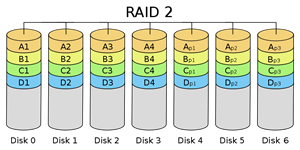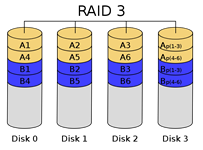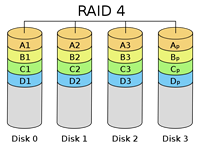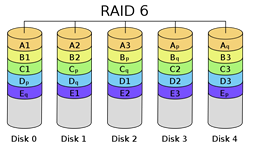RAID Data Recovery Connecticut












Need RAID Data Recovery Services in Connecticut?
When RAID recovery is needed, individuals and businesses rely on CT Data Recovery Services to recover RAID data that’s essential for their businesses to operate. We provide RAID data recovery services for all RAID configurations. See the specific RAID recovery configurations we can assist with below:
- RAID 0 Data Recovery
- RAID 1 Data Recovery
- RAID 2 Data Recovery
- RAID 3 Data Recovery
- RAID 4 Data Recovery
- RAID 5 Data Recovery
- RAID 6 Data Recovery
- RAID 7 Data Recovery
- RAID 10 Data Recovery
- RAID 0+1 Data Recovery
- RAID 10 Data Recovery
- RAID 53 Data Recovery
- RAID S Data Recovery
What NOT to do if you need RAID Recovery in CT
1) Do not attempt to rebuild your RAID array in an effort to recover your RAID configuration. Rebuilding your raid may result in data loss. Only rebuild a RAID IF ALL of the hard drives are present, fully functional, connected in the correct sequential order, and the RAID controller also performs its post and any other test routines flawlessly.
2) If one or more than one disk in your RAID has failed then it will be necessary to start looking for a RAID recovery solution.
3) Do not remove any drives from the RAID configuration and attempt to perform RAID data recovery on a single drive. Doing so may result in permanent data loss.
4) Do not allow the RAID controller to execute write operations on any known working drives thus overwriting striping data needed for the RAID reconstruction.
5) Avoid using CHKDSK for raid recovery and if you attempt to do so use extreme caution; successes with this attempt are very limited. It’s advised that you do not guess.
6) Don’t attempt to try numerous experiments to bring back data that is inaccessible. Call us for all your RAID data recovery needs.
What to DO if you need RAID Recovery in CT
1) Gather any documentation for your RAID configuration including physical disk arrangement and order of the connection for all component devices.
2) Make sure each drive is clearly labeled with the correct number representing the order as this will be necessary for the RAID data recovery purposes.
3) If you attempt to recover your RAID from a failed hard drive, carefully document every remedial step taken and provide this information to us. We strongly suggest that if you are not familiar with RAID recovery, you leave this to the experts. Tampering with a RAID configuration without any knowledge can cause PERMANENT DATA LOSS.
4) Know that building a RAID reporting a corrupted file system will not repair it, but further corrupt your data, possibly making it unrecoverable.
5) Contact us if you need a professional RAID Recovery service that will give you the peace of mind knowing that your data will be recovered with the highest success rate in the industry.
RAID Recovery Service Areas We Support in Connecticut
- Hartford CT RAID Data Recovery
- West Hartford CT RAID Data Recovery
- East Hartford CT RAID Data Recovery
- Farmington CT RAID Data Recovery
- Wethersfield CT RAID Data Recovery
- Rocky Hill CT RAID Data Recovery
- Bristol CT RAID Data Recovery
- Avon CT Raid RAID Recovery
- Newington CT RAID Data Recovery
- Meriden CT RAID Data Recovery
- Bristol CT RAID Data Recovery
- Manchester CT RAID Data Recovery
- Glastonbury CT RAID Data Recovery
- Berlin CT RAID Data Recovery
- New Haven CT RAID Data Recovery
- Waterbury CT RAID Data Recovery
Information About our CT RAID Recovery Services
RAID 0 Recovery Services
 This RAID Recovery service is one of the most difficult to perform as RAID 0 relies on more than one drive to operate. If one drive fails in the array, then the failing drive must be rebuilt in order for RAID data recovery to be possible. The more drives in a RAID 0 configuration, the likelihood of failure is more prominent which makes it a difficult recovery. We have a high level of successful with all our RAID 0 Recovery services which makes our RAID recovery company the company of choice when it comes to RAID 0.
This RAID Recovery service is one of the most difficult to perform as RAID 0 relies on more than one drive to operate. If one drive fails in the array, then the failing drive must be rebuilt in order for RAID data recovery to be possible. The more drives in a RAID 0 configuration, the likelihood of failure is more prominent which makes it a difficult recovery. We have a high level of successful with all our RAID 0 Recovery services which makes our RAID recovery company the company of choice when it comes to RAID 0.
RAID 1 Recovery Services
 RAID 1 recovery is generally easier compared to other RAID configurations. RAID 1 does not require both drives to be operational in order to recover the data. Drives on RAID 1 mirror one another so it is possible to retrieve data on a single hard drive.
RAID 1 recovery is generally easier compared to other RAID configurations. RAID 1 does not require both drives to be operational in order to recover the data. Drives on RAID 1 mirror one another so it is possible to retrieve data on a single hard drive.
RAID 2 Recovery Services
 RAID 2 recovery is needed if you have a configuration where all disk spindle rotation is in sync and data is striped such that each sequential bit is on a different drive. This could potentially be a very easy recovery as you can recover from 1 drive failure although other hardware failures could complicate the recovery process.
RAID 2 recovery is needed if you have a configuration where all disk spindle rotation is in sync and data is striped such that each sequential bit is on a different drive. This could potentially be a very easy recovery as you can recover from 1 drive failure although other hardware failures could complicate the recovery process.
RAID 3 Recovery Services
 In a RAID 3 all disk spindle rotation is syncronized and data is striped so each sequential bit is on a different drive. This could be a potentially straight forward RAID recovery granted that only one drive has failed.
In a RAID 3 all disk spindle rotation is syncronized and data is striped so each sequential bit is on a different drive. This could be a potentially straight forward RAID recovery granted that only one drive has failed.
RAID 4 Recovery Services
 RAID 4 looks similar to RAID 5 except that it does not use distributed parity, and similar to RAID 3 except that it stripes at the block level, rather than the byte level. RAID 4 data recovery requires all disk members to be present so we can assemble the RAID as it was set prior to the failure.
RAID 4 looks similar to RAID 5 except that it does not use distributed parity, and similar to RAID 3 except that it stripes at the block level, rather than the byte level. RAID 4 data recovery requires all disk members to be present so we can assemble the RAID as it was set prior to the failure.
RAID 5 Recovery Services
 RAID 5 data recovery is most common among all the raid configurations. Most businesses go with RAID 5 as it’s the most reliable given its low cost of implementation. Most storage devices and servers ship with RAID 5 which is another reason that makes this the most common recovery we perform.
RAID 5 data recovery is most common among all the raid configurations. Most businesses go with RAID 5 as it’s the most reliable given its low cost of implementation. Most storage devices and servers ship with RAID 5 which is another reason that makes this the most common recovery we perform.
Unfortunately when RAID 5 fails, it can be very complex to recover. Rest assured we are experts in RAID 5 recovery and have the tools and knowledge to recover from the worst of RAID 5 failures.
RAID 6 Recovery Services
 RAID 6 extends RAID 5 by adding additional parity block; thus it uses block-level striping with two parity blocks distributed across all member disks. This could be one of the most complex of RAID recoveries as there are multiple hard drives involved.
RAID 6 extends RAID 5 by adding additional parity block; thus it uses block-level striping with two parity blocks distributed across all member disks. This could be one of the most complex of RAID recoveries as there are multiple hard drives involved.
Non-Standard RAID Recoveries we perform:
- RAID 7 Recovery Services
- RAID 10 Recovery Services
- RAID 0+1 Recovery Services
- RAID 53 Recovery Services
- RAID S Recovery Services
